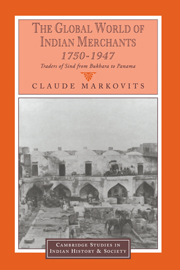Book contents
- Frontmatter
- Contents
- List of maps
- List of tables
- Acknowledgements
- Glossary
- Introduction
- 1 South Asian merchant networks
- 2 The regional context: Sind economy and society, c. 1750–1950
- 3 The Gate of Khorrassan: the Shikarpuri network, c. 1750–1947
- 4 From Kobe to Panama: the Sindworkies of Hyderabad
- 5 Patterns of circulation and business organization in two merchant networks
- 6 The business of the Sind merchants
- 7 The politics of merchant networks
- 8 Community and gender in two merchant networks
- 9 Epilogue: the Sindhi diaspora after 1947
- Conclusion
- Appendices
- Bibliography
- Index
8 - Community and gender in two merchant networks
Published online by Cambridge University Press: 22 October 2009
- Frontmatter
- Contents
- List of maps
- List of tables
- Acknowledgements
- Glossary
- Introduction
- 1 South Asian merchant networks
- 2 The regional context: Sind economy and society, c. 1750–1950
- 3 The Gate of Khorrassan: the Shikarpuri network, c. 1750–1947
- 4 From Kobe to Panama: the Sindworkies of Hyderabad
- 5 Patterns of circulation and business organization in two merchant networks
- 6 The business of the Sind merchants
- 7 The politics of merchant networks
- 8 Community and gender in two merchant networks
- 9 Epilogue: the Sindhi diaspora after 1947
- Conclusion
- Appendices
- Bibliography
- Index
Summary
The literature on trading diasporas lays great emphasis on the notion of community, which is generally defined on the basis of a common ethnicity and a common religion, sometimes also of a caste. It will be argued here that, in the case of the Sind merchants, this definition did not really apply. For Shikarpuris and Sindworkies, community meant above all locality, and the bonds which defined it were those of co-residence and kinship rather than of ethnicity, religion and caste. In the dispersion, these bonds became somewhat loosened and though great store was set on the fictive kinship ties of ‘brotherhood’, they were more an idealized fiction than an actual factor of solidarity. As a result, trust was not easy to establish, opportunistic and violent behaviour of different kinds was widespread. One of the contributing factors was the absence of women, and that is why it is not possible to overlook the problem of gender and of the specific sexual economy of these merchant networks.
The meaning of community among Sind merchants
The first point to note is that there did not develop an overarching sense of ‘ethnic’ solidarity between Sind merchants belonging to different towns even when they met abroad. Shikarpuris and Sindworkies in particular do not appear to have interacted even when both groups were represented in a locality.
- Type
- Chapter
- Information
- The Global World of Indian Merchants, 1750–1947Traders of Sind from Bukhara to Panama, pp. 249 - 276Publisher: Cambridge University PressPrint publication year: 2000



